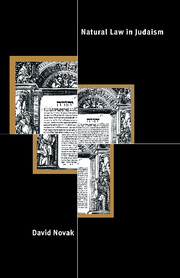5 - Natural law and created nature
Published online by Cambridge University Press: 28 October 2009
Summary
If my covenant does not endure by day and by night, then I will not have established the laws of heaven and earth.
(Jeremiah 33:25)LAW AND NATURE
Any theory of natural law must sooner or later consider just what it means by “nature.” This is a difficult task inasmuch as nature is a notoriously slippery idea. Nevertheless, without the proper constitution of nature, a theory of natural law will inevitably become a description of features of the human condition too vague to have any normative meaning at all. Thus, for example, one can generally observe that there is no human community that has permitted murder. As an empirical generalization, all that this states is that there seems to be no human community that permits unlimited killing – and no human community that prohibits all killing (minimally as we see in justifications of killing in self-defense, either individual or social). But that in no way tells us precisely enough who may not be killed and who may be killed and why. It does not tell us what are the grounds for the prohibition of murder anywhere. So also, one can generally observe that there is no human community that permits one to have sexual relations with everyone else – and no human community that prohibits all sexual activity. (In those cultures in which celibacy is permitted, that permission has always been made to a small minority of its members, who are still dependent on the larger procreating community for their continuity.) As an empirical generalization, all that this states is that there seems to be no human community that permits unlimited sexuality.
- Type
- Chapter
- Information
- Natural Law in Judaism , pp. 122 - 148Publisher: Cambridge University PressPrint publication year: 1998



